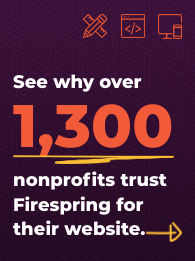You may have heard a version of the phrase, “They can’t put anything on the internet if it isn’t true,” however, this is far from reality. Anyone with access to the internet is able to write or publish anything he or she pleases, no matter if the information is true or not. Recently, this spread of false information has been dubbed “fake news” and below are reasons why you should be concerned about the impact of fake news on your organization and its reputation, and what you can do about it.
How does fake news spread?
PEW Research found that 62 percent of adults in the United States get their news from social media, and this is often the easiest place for fake news to spread. Since Facebook, Twitter and other social media platforms are built to easily share information, posts are not censored or otherwise checked to ensure they are factual. This means that nearly any post, even those about you or your organization, can be shared and can quickly go viral—even if they’re untrue.
In today’s online environment, users are shown content based on likes and preferences. Though this content curation shows us things that we like to see, it can also limit the diversity of our news sources and even distort our perception of what is true online and what isn’t. This echo chamber of information only serves to reinforce our existing beliefs and does little to challenge us to dig deeper and verify what we are reading or to see both sides of an issue.
What does fake news mean to me and my organization’s reputation?
Today, your online reputation is really an extension of you and your organization’s real-life reputation. Others in the community see you as trustworthy, dependable and knowledgeable about your cause. When you and your organization enter the digital space, these reputations follow you—and you must work to ensure your reputation online matches that of yours in the real world.
Just like in the real world, your digital influence is built over time. When you share news and information via Facebook and Twitter, your followers expect the information you share to be true and factual. When you share articles with false information or news that isn’t true, you begin to lose the trust of your audience, and your reputation online and in the real world may suffer.
How do I combat fake news to protect my reputation?
It’s not always easy to spot a post or link that could contain fake news. Many times these articles are published by look-alike websites designed to make the user believe he or she is reading an article from a credible news source. If you’re wondering whether an article or post you are reading is legit, ask yourself these things:
- Is this information from a credible source? (Make sure to double-check the website URL to make sure you’re on the right page.)
- Have other news outlets posted this story/information?
- Can I verify the story with another person?
- Does this story pass the ‘smell’ test? Does it seem over-the-top or too good to be true?
Even the savviest internet user can fall prey to the tantalizing headlines and clickbait-esque articles in his or her news feed. To help users identify and stop the spread of fake news and misleading information, Facebook is beginning to apply a warning label to articles and posts that have been tagged as ‘disputed.’ Even with this enhanced accuracy filter, it is still up to the individual to ensure what he or she is sharing is factual and makes sense for your brand or organization.
Keeping your constituents informed
For organizations whose mission is focused around public health, human rights or environmental preservation, politicization of information has made it more important than ever to ensure you are sharing the facts. Recent studies from the American Psychological Association show simply reading false information more than once can make it seem more true; but one approach researchers found highly effective in combating false information is simply going on the offense.
Instead of waiting to defend your cause, telling and showing your audience the facts and scientific evidence before they are bombarded with false information can help prepare them to dispel any fake news they may come across. Combining statistics and data with testimonials and narratives about your organization and the impact you create can augment your message and give it more power and authority than numbers alone.
Since your community depends on factual and accurate information about your organization, its mission and the impact you create, you must own your online presence and make your reputation known. Having an active, updated website and social media presence will go a long way in proving to those online that you are the real deal. If your website is stuck in 2005 and needs updating, Firespring will show you what your website could be with a free demo. Having trouble connecting with your audience on social media? Firespring offers social media services for nonprofits too.

